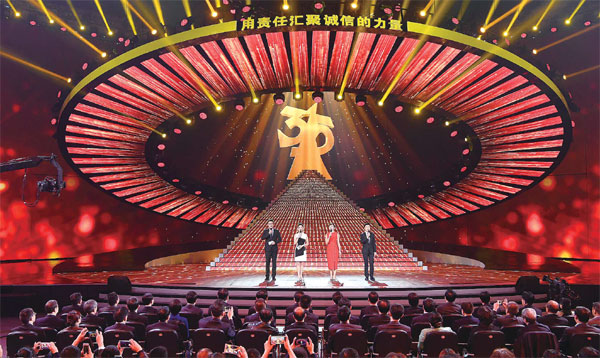TV show exposes the top product scandals of 2017
If the Spring Festival Gala is China Central Television's annual celebration of everything glittery and harmonious, the 315 Gala would be its evil twin. For 26 years, this TV spectacle has been exposing misconduct in the Chinese business world on the evening of March 15, also known as World Consumer Rights Day.
Local governments and law enforcement usually follow up the very next day by investigating and cracking down on the companies and brands named in the show.
If only reality shows were this satisfying.

Co-produced by CCTV, China Consumer's Association and more than a dozen government agencies, including the Supreme People's Court, Ministry of Public Security and Ministry of Commerce, the 315 Gala aims to raise awareness of consumer rights and communicate the government's determination to regulate the market. Investigative footage captured by hidden cameras and teary testimonies from consumer victims are some of the ratings-grabbing highlights of the gala.
Over the years, from a bakery selling expired bread to toxic stationery, from false advertising of traditional Chinese medicine to fire extinguishers produced on the cheap, the show has exposed scandals across various industries. Major foreign brands aren't immune: Nikon, Apple, Carrefour, Jaguar and Volkswagen, to name a few, have all ended up on the air.
So who made it onto the blacklist in this year's edition, and what do they say about China's current consumer market? Let's have a look.
Baike.com
The self-proclaimed "world's largest Chinese encyclopedia website", Baike.com was exposed on the show for listing paid promotional content on medicine, healthcare products, medical organizations and medical items. Baike apologized via its official Weibo account and promised to re-evaluate its user base. The company is currently under investigation by the Beijing police.
K.S. Light Technology
Under the pretext of free vision tests, K.S. Light Technology, based in Zhengzhou, Henan province, was accused of collecting personal information from more than 130,000 primary, middle and high school students and encouraging many of them to wear a "cornea-shaping lens" which, if not prescribed or worn properly, could cause serious cornea infection. Law enforcement in Zhengzhou swiftly closed down K.S. Technology and two other pharmaceutical companies mentioned during the gala.
Sufeitai
This brand of fodder claims to be able to put 1.5 kilograms of weight on a pig daily. It was said to contain olaquindox, a chemical banned in animal fodder, and excessive diludine, a chemical that is strictly regulated.
Muji
It was stated during the gala that the packages for some foods sold in Muji supermarkets were relabeled with a sticker put over their original production area to hide the fact that they came from banned areas for food importation due to the Fukushima nuclear accident. Muji has denied the accusation, saying that the gala mistook its company address for the foods were produced.
Nike
Nike's "Zoom Air" basketball shoes were said to lack air cushions mentioned in advertising. Nike's response was to offer a full refund for the item while refusing to admit false advertising - only that it gave "the wrong description of the product".
International Mother and Baby Health Association
There is currently high demand in China for maternity matrons, hired to look after new mothers and babies. This organization is accused of being a "certificate mill" that issues training certificates for a price. It's said that without having to attend a single lecture you can be certified as a senior maternal and infant caretaker for 1,380 yuan ($200; 185 euros; 161).
Runjiu Bio-Tech Co
Targeting the elderly, this company claims its propolis (a resinous substance collected by bees) capsules can cure diabetes in 90 days. They can supposedly be found on the market for more than 60 times its sticker price of 65 yuan per box. The company also developed a marketing strategy of luring people with high commission fees to become "lecturers" to promote the product across the country. Its web page on e-commerce website Alibaba has been taken down since the gala.
It's cathartic to watch these high-profile exposes and see efforts going toward fighting these problems, but it's no more than the tip of the iceberg when it comes to fixing problems in the Chinese consumer market.
Courtesy of The World of Chinese, www.theworldofchinese.com
The World of Chinese
